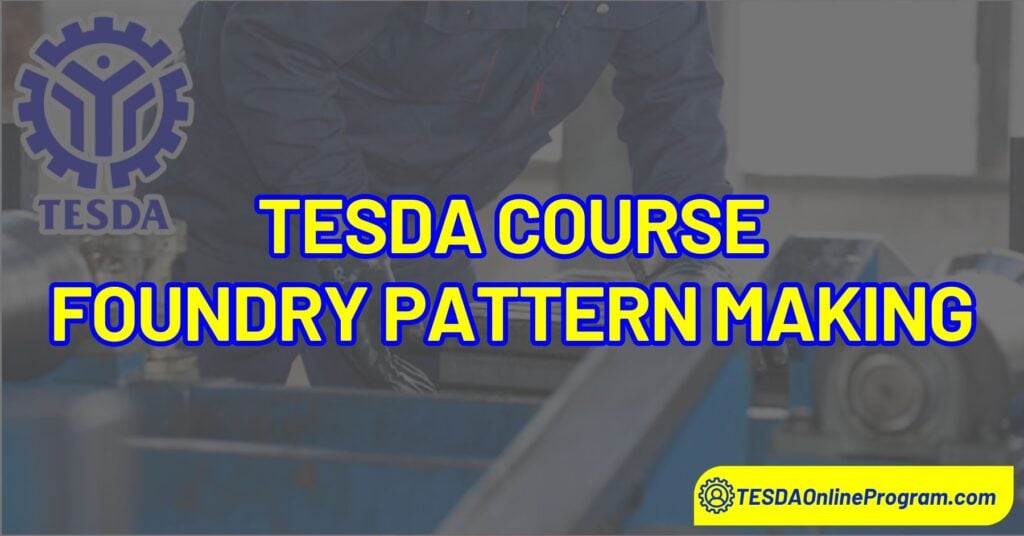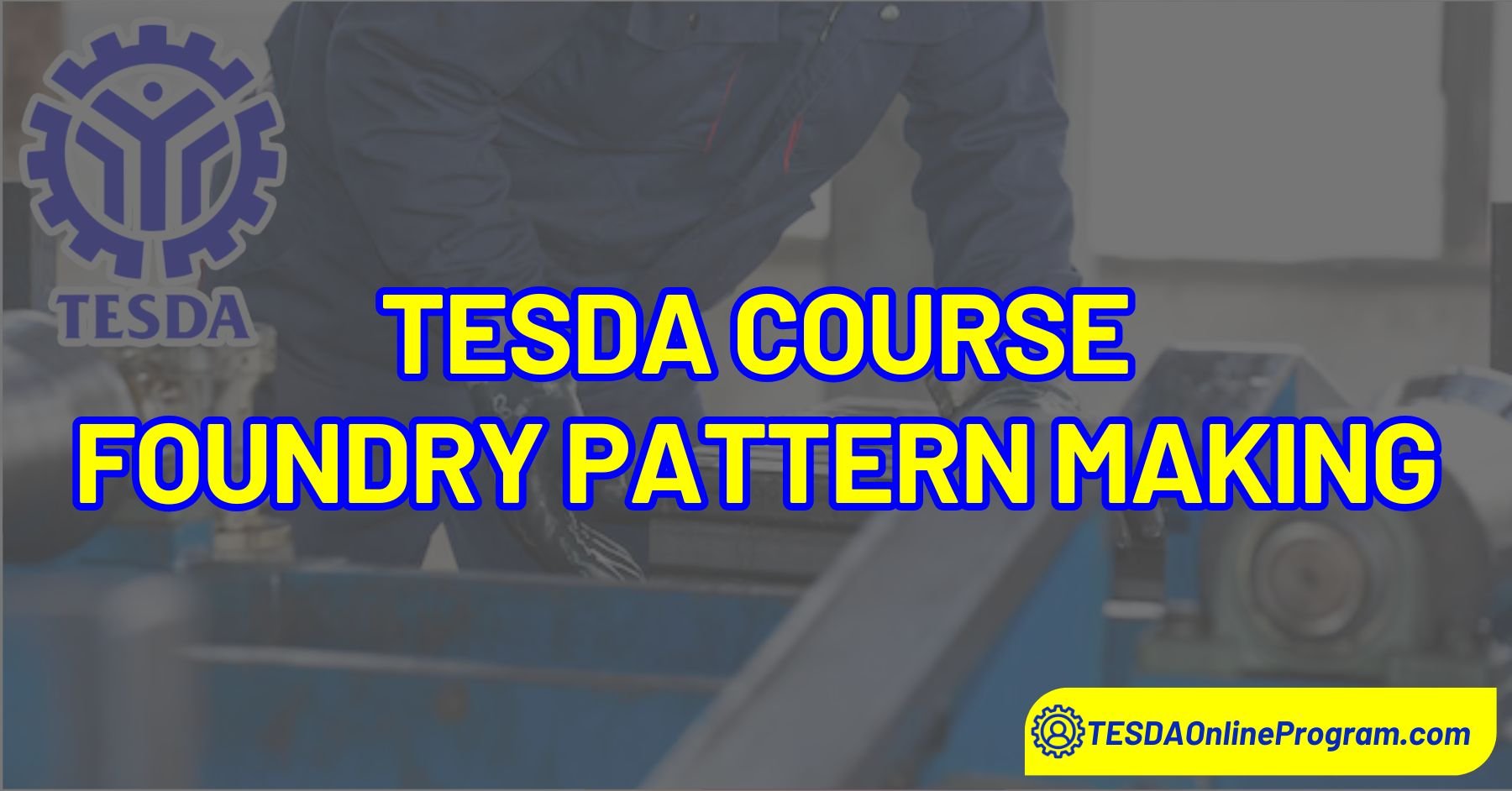The Foundry and Pattern Making Courses (NC II and NC III) courses by TESDA equip individuals with essential skills to create high-quality patterns for industries like engineering and automotive. The NC II course covers manufacturing solid, split, and turned patterns using materials like timber composites, as well as training in inspection, technical drawing interpretation, and operating metalworking machines.
Also read: TESDA Plastic Machine Operation Courses
Building on NC II, the NC III course focuses on advanced skills such as creating core boxes for shell core sand, and producing patterns for gears, conveyor screws, and propellers. Students also learn to develop gravity die casting molds used in various industries. Both courses meet industry standards, providing local and international job opportunities for skilled pattern makers.

Benefits
Benefits of Taking TESDA Foundry Pattern Making Courses
- Comprehensive Knowledge and Skills – Foundry Pattern Making courses offer practical training and in-depth knowledge of pattern-making techniques.
- Enhanced Job Opportunities – Completing the course qualifies individuals for roles such as pattern maker or foundry worker, addressing the increasing demand within the manufacturing sector.
- Industry Versatility – The skills acquired are highly adaptable and can be applied across various industries, including automotive, aerospace, and marine.
- Global Recognition – Graduates earn a National Certificate (NC) or Certificate of Competency (COC), credentials recognized internationally for enhanced career opportunities.
Foundry Patternmaking NC II
The Foundry – Pattern Making NC II course trains individuals to manufacture various types of patterns, including solid, split, and turned patterns, using timber and composites. It covers inspection, interpretation of drawings, repair procedures, and operation of specialized machines. Skills include utilizing precision tools and maintaining melting equipment, ensuring patterns meet strength and accuracy requirements.
Units of Competency
The Competency Units in this Qualification include:
Basic Competencies
- Participate in workplace communication
- Work in a team environment
- Practice career professionalism
- Practice occupational health and safety procedures
Common Competencies
- Read and interpret engineering drawings
- Perform mensuration and calculation
- Read, interpret and apply specifications and manuals
- Perform shop maintenance
Core Competencies
- Develop and manufacture wood patterns
- Develop and manufacture polymer patterns
- Develop and manufacture assembled plated patterns
- Develop and manufacture production patterns
- Perform general woodworking machine operations
- Use and maintain measuring instruments
Career Opportunity
A person who has achieved this qualification is competent to be:
- Foundry Patternmaker
Assessment Methods
- Written examination
- Demonstration of practical skills
- Direct observation
- Interview
Course Delivery
- Self-paced instruction
- Demonstration
- Lecture
- Discussion
- Dual training
- Distance learning
Training Duration
- Basic: 18 hours
- Common: 20 hours
- Core: 120 hours
Total: 158 hours
Qualifications
This section outlines trainee qualifications, educational experience, health and physical requirements, and possible entry exams.
- Experience in basic machining
- Good moral character
- Physically and mentally fit
- Strong oral and written communication skills
Sample of Certificate of Completion

Foundry Patternmaking NC III
The Foundry Patternmaking NC III course trains individuals to create core boxes for shell core sand, and develop patterns for gears, conveyor screws, and propellers. It also covers gravity die casting mold development for automotive and related industries.
Units of Competency
The Competency Units in this Qualification include:
BASIC COMPETENCIES
- Lead workplace communication
- Lead small teams
- Develop and practice negotiation skills
- Solve problems related to work activities
- Use mathematical concepts and techniques
- Use relevant technologies
COMMON COMPETENCIES
- Read, Interpret and Apply Engineering Drawings
- Perform Mensuration and Calculation
- Read, Interpret and Apply Specifications and Manuals
- Perform Shop Maintenance
CORE COMPETENCIES
- Manufacture and Develop Corebox for Shell Core Sand
- Develop And Manufacture Gear, Conveyor Screw And Propeller Patterns
- Develop Gravity Die Casting Mold
Career Opportunities
A person who has achieved this qualification is competent to be:
- Foundry Patternmaker (Shell Core and other Complex Patterns)
- Foundry Patternmaker (Die Cast Mold)
Training Duration
- 20 Hours (Basic Competencies)
- 20 Hours (Common Competencies)
- 72 Hours (Core Competencies)
Total: 112 hours
Assessment Methods
- Observation with questioning
- Demonstration of practical skills
- Portfolio
- Third party report
Course Delivery
- Demonstration
- Lecture
- Discussion
- Dual training
Qualifications
This section lists trainee qualifications, education, health/fitness standards, and possible entry exams.
- Experience in basic machining
- Physical and mental fitness
- Possession of the Foundry-Patternmaking National Certificate (NC) II
- Proficiency in both oral and written communication
Requirements
To enroll, you will need the following documents:
- PSA Birth Certificate
- High School or College Diploma
- Certified True Copy of Official Transcript of Records or Form 137
- Certificate of Good Moral Character or GMRC
- 1 x 1 and/or 2 x 2 pictures
To obtain further details, please reach out to the enrollment site that aligns with your requirements. Kindly note that the criteria may vary.
Frequently Asked Questions
1. What is the difference between Foundry Patternmaking NC II and NC III?
A: The Foundry Patternmaking NC II focuses on basic pattern-making techniques using timber and composites, while the NC III delves into more complex patterns involving gears, conveyor screws, and propellers.
2. Can I apply for both courses at once?
A: Yes, you can enroll in both courses to further enhance your skills in foundry patternmaking.
3. Are there any specific qualifications needed to enroll in these courses?
A: Prospective trainees must have experience in basic machining, good moral character, and physical/mental fitness. They should also possess strong communication skills.
4. How long does it take to complete each course?
A: The Foundry Patternmaking NC II takes approximately 158 hours, while the NC III takes around 112 hours.
5. What career opportunities are available after completing these courses?
A: Graduates can become Foundry Patternmakers in industries like automotive and manufacturing, with opportunities to work internationally.
6. Can I enroll in these courses without prior experience?
A: Basic machining experience is preferred but not required. Trainees must have the skills to complete the course successfully.
Video: New TESDA Courses 2024 | Free Courses, Uniform, and Allowances
If you are looking to expand your skills and knowledge, then you’ll be delighted to hear that TESDA will be offering new courses starting 2024. These courses will not only provide quality education but also come with additional perks such as free uniforms and allowances.
Summary
Foundry Patternmaking courses cover essential skills like workplace communication, teamwork, safety, engineering drawings, measurements, and woodworking operations. NC II takes 158 hours, and NC III takes 112 hours to complete. Graduates can work as Foundry Patternmakers in industries like automotive and manufacturing, with international opportunities. Applicants need good moral character, physical/mental fitness, and strong communication skills. Enroll in both NC II and NC III to advance your expertise.

